Related Research Articles

Dragon Ball Z: The Return of Cooler is a 1992 Japanese anime science fiction martial arts film, the sixth Dragon Ball Z film, originally released in Japan on March 7 at the Toei Anime Fair along with the second Dragon Quest: Dai no Daibōken film and the third Magical Tarurūto-kun film. It was preceded by Dragon Ball Z: Cooler's Revenge and followed by Dragon Ball Z: Super Android 13!.

Dragon Ball Z: Super Android 13 is a 1992 Japanese anime science fiction martial arts film and the seventh Dragon Ball Z film. It was originally released in Japan on July 11 at the Toei Anime Fair along with the third Dragon Quest: Dai no Daibōken film and the Rokudenashi Blues film. Early concept art for the reissue used the title Android Assault, but the final product went back to using Funimation's original title for the film. It was preceded by Dragon Ball Z: The Return of Cooler and followed by Dragon Ball Z: Broly – The Legendary Super Saiyan.

Dragon Ball Z: Bojack Unbound is a 1993 Japanese animated science fantasy martial arts film and the ninth Dragon Ball Z feature film. It was released in Japan on July 10 at the Toei Anime Fair, where it was shown alongside Dr. Slump and Arale-chan: N-cha! From Penguin Village with Love and the first Yu Yu Hakusho film. The antagonist Bojack was created by Takao Koyama and was designed by series creator Akira Toriyama. The film is the last to feature Kōhei Miyauchi as Master Roshi, who died two years after its release. It was preceded by Dragon Ball Z: Broly – The Legendary Super Saiyan and followed by Dragon Ball Z: Broly – Second Coming.

Dragon Ball GT: Final Bout, known in Japan and Europe as Dragon Ball: Final Bout, is a fighting game for the PlayStation. The game was developed by TOSE and released by Bandai in Japan, Europe and North America in 1997, making it the first North American release for a Dragon Ball video game.
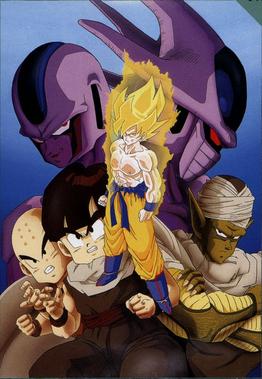
Dragon Ball Z: Cooler's Revenge is a 1991 Japanese anime science fiction martial arts film and the fifth Dragon Ball Z animated feature film, originally released in Japan on July 20 at the Toei Anime Fair. It was preceded by Dragon Ball Z: Lord Slug and followed by Dragon Ball Z: The Return of Cooler. Set in an alternate continuity to the main story, the movie introduces Cooler, the estranged older brother of Frieza, who travels to Earth to challenge and defeat Goku after hearing that he defeated Frieza.

Dragon Ball Z: Idainaru Dragon Ball Densetsu is a 1996 fighting video game co-developed by BEC and Tose and published by Bandai for the PlayStation and Sega Saturn. Based upon Akira Toriyama's Dragon Ball franchise, following the Saiyan arc to the conclusion of the Majin Buu saga, it is the first three-dimensional fighting game in the series prior to Budokai Tenkaichi. Its gameplay consists of three-on-three fights taking place on free-roaming 3D arenas, using a main six-button configuration, featuring special moves as well as three playable modes.
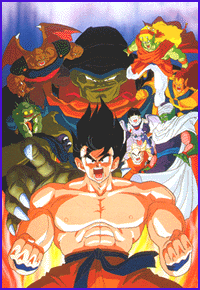
Dragon Ball Z: Lord Slug is a 1991 Japanese animated science fiction martial arts film and the fourth Dragon Ball Z feature film. It was originally released in Japan on March 9 between episodes 81 and 82 at the Toei Anime Fair as part of a double feature with the first Magical Tarurūto-kun film. It was preceded by Dragon Ball Z: The Tree of Might and followed by Dragon Ball Z: Cooler's Revenge.

Dragon Ball Z Hit Song Collection series is a soundtrack series from the anime Dragon Ball Z. It was produced and released by Columbia Records in Japan only, from July 21, 1989 to March 20, 1996 the show's entire lifespan. The collection features a variety of theme songs, insert songs, image songs, character songs, instrumental suites, remixes, and medleys. On September 20, 2006, Columbia re-released the Hit Song Collection on their Animex 1300 series.
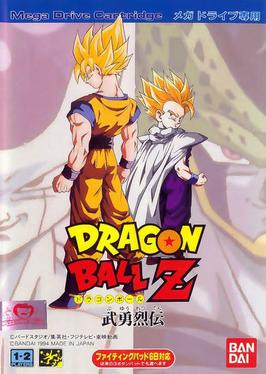
Dragon Ball Z: Buyū Retsuden is a 1994 fighting video game developed and published by Bandai and Ecofilmes for the Sega Mega Drive. Based upon Akira Toriyama's Dragon Ball franchise, it is the only game in the series released for the Mega Drive, following the Frieza and Cell sagas. Its gameplay has been described as a combination of the original Super Butōden and Super Butōden 2, consisting of one-on-one fights using a three-button configuration, featuring special moves and two playable modes.

Dragon Ball Z: Budokai known as in Japan as simply Dragon Ball Z is a series of fighting video games based on the anime series Dragon Ball Z, itself part of the larger Dragon Ball franchise.

Dragon Ball Kai: Ultimate Butōden is a fighting video game for the Nintendo DS based on the Dragon Ball franchise. It was released in Japan on February 3, 2011.
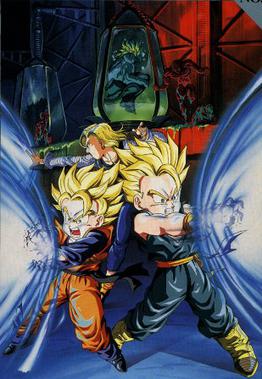
Dragon Ball Z: Bio-Broly is a 1994 Japanese animated science fiction martial arts film and the eleventh Dragon Ball Z feature film. It was released in Japan on July 9 at the Toei Anime Fair alongside Dr. Slump and Arale-chan: N-cha!! Excited Heart of Summer Vacation and the second Slam Dunk film. It is the third Dragon Ball Z film to feature the character of Broly, albeit as a genetic clone. It was preceded by Dragon Ball Z: Broly – Second Coming and followed by Dragon Ball Z: Fusion Reborn.
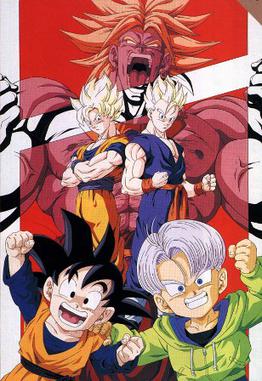
Dragon Ball Z: Broly – Second Coming is a 1994 Japanese anime science fiction martial arts film and the tenth Dragon Ball Z feature film. It was released in Japan on March 12 at the Toei Anime Fair alongside Dr. Slump and Arale-chan: Hoyoyo!! Follow the Rescued Shark... and the first Slam Dunk film. It was preceded by Dragon Ball Z: Bojack Unbound and followed by Dragon Ball Z: Bio-Broly.

Dragon Ball Z: Super Butōden, known as Dragon Ball Z in Europe, is a 1993 fighting video game developed by Tose and published by Bandai for the Super Nintendo Entertainment System. It is based upon Akira Toriyama's Dragon Ball franchise, and was its first fighting game.
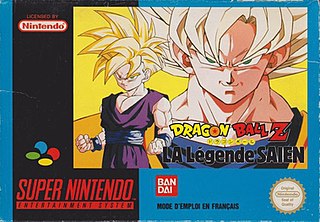
Dragon Ball Z: Super Butōden 2 is a 1993 fighting video game developed by Tose and published by Bandai for the Super Nintendo Entertainment System. Based upon Akira Toriyama's Dragon Ball franchise, it is the sequel to Dragon Ball Z: Super Butōden, which was released earlier in 1993 for SNES. Following the Cell Games arc and a side-story about characters from the films Dragon Ball Z: Broly – The Legendary Super Saiyan and Dragon Ball Z: Bojack Unbound, its gameplay remains relatively the same as the original Super Butōden, consisting of one-on-one fights using a main six-button configuration, featuring special moves as well as three playable modes.

Dragon Ball Z: Super Butōden 3 is a 1994 fighting video game developed by Tose and published by Bandai for the Super Nintendo Entertainment System. Based upon Akira Toriyama's Dragon Ball franchise, it is the sequel to Dragon Ball Z: Super Butōden 2, which was released earlier in 1993 for SNES. Following the Majin Buu arc, its gameplay remains relatively the same as the previous two Super Butōden entries, consisting of one-on-one fights using a main six-button configuration, featuring special moves as well as two playable modes.

Dragon Ball Z: Hyper Dimension is a 1996 fighting video game developed by Tose and published by Bandai for the Super Nintendo Entertainment System. Based upon Akira Toriyama's Dragon Ball franchise, it is the last fighting game in the series to be released for SNES. Following from the Frieza saga to the conclusion of the Majin Buu saga, its gameplay is similar to the earlier Butōden entries, consisting of one-on-one fights using a main six-button configuration, featuring special moves as well as multiple game modes.

Dragon Ball Z: Idainaru Son Goku Densetsu is a 1994 fighting video game developed by BEC and published by Bandai for the PC Engine Super CD-ROM² add-on. Based upon Akira Toriyama's Dragon Ball franchise, it is a retelling of Goku's seven major battles over the course of the series up to the conclusion of the Cell Games saga. Idainaru Son Goku Densetsu was created by most of the same team at BEC that would go on to work on Dragon Ball Z: Idainaru Dragon Ball Densetsu. The game received generally positive reception from critics who reviewed it as an import title but criticism was geared towards its difficulty level.
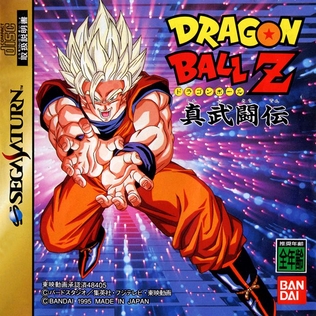
Dragon Ball Z: Shin Butōden is a 1995 fighting video game developed by Tose and published by Bandai for the Sega Saturn. Based upon Akira Toriyama's Dragon Ball franchise, its gameplay is similar to the Super Butōden sub-series, consisting of one-on-one fights featuring special moves, as well as five playable modes including one featuring Mr. Satan as the main character.
References
- ↑ "Dragon Ball Z: Saiyan Zetsumetsu Keikaku Game Music" (in Japanese). Oricon . Retrieved 2009-02-09.
- ↑ "Dragon Ball Z: Super Butoden Game Music" (in Japanese). Oricon . Retrieved 2009-02-09.
- ↑ "Dragon Ball Z: Super Butoden 2 Game Music" (in Japanese). Oricon . Retrieved 2009-02-09.
- ↑ "Dragon Ball Z: Super Butoden 3 Game Music" (in Japanese). Oricon . Retrieved 2009-02-09.
- ↑ "Dragon Ball Z: Super Gokuden Assault Compilation" (in Japanese). Oricon. Archived from the original on 2009-06-11. Retrieved 2009-02-09.
- ↑ "Dragon Ball Z Super Gokuuden Assault Chapter". RPGFan. Archived from the original on December 25, 2008. Retrieved September 27, 2008.
- ↑ "Dragon Ball Z: Ultimate Battle 22 Game Music Birth Compilation" (in Japanese). Oricon . Retrieved 2009-02-09.
- ↑ "Dragon Ball Z: Game Music Awakening Compilation" (in Japanese). Oricon . Retrieved 2009-02-09.
- ↑ "Dragon Ball Z: Game Music Rebirth Compilation" (in Japanese). Oricon. Archived from the original on 2009-06-11. Retrieved 2009-02-09.
- ↑ "Dragon Ball Z: Idainaru Dragon Ball Densetsu Game Music" (in Japanese). Oricon . Retrieved 2009-02-09.
- ↑ "Columbia R-Ban" (in Japanese). Columbia R-Ban. Archived from the original on June 11, 2009. Retrieved September 27, 2008.